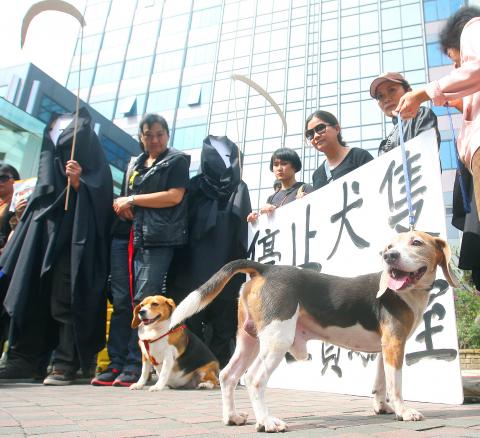Animal rights activists and pet lovers yesterday gathered in front of the Atomic Energy Council (AEC) to protest against the use of beagles in animal experiments.
The group was protesting against toxicity and safety tests for a new drug being developed by the council’s Institute of Nuclear Energy Research (INER) that are being carried out on beagles.
Holding up a banner reading “Protest against animal abuse! The AEC disregards life!” and accompanied by 10 beagles, the group of about 30 protesters urged the council to stop testing new drugs on animals.

Photo: CNA
Animal rights advocate Huang Tai-shan (黃泰山) said the council made a worldwide call for bids on the Internet earlier this month for 40 beagles to conduct drug tests.
The council is asking for beagles who have cancer, Huang said, adding that the council dissects some of the dogs on the second day after being injected with an experimental drug and that more are dissected on the 15th day of the testing.
“The lucky ones that survive the experiment are sent to other research centers for other experiments until they die,” he said.
The council denied asking for cancerous dogs, saying that the beagles imported are healthy dogs.
Wang Hsiao-hua (王小華), a member of the Kaohsiung Concern Stray Animal Association, said the beagles that were experimented on were just like any other pet beagle, and experienced fear and pain during the tests.
Many animal experiments to develop drugs have already proven ineffective, so the council should find alternative methods to test drugs, Huang said, adding that they were also strongly against the establishment of a dog radiotoxicological experiment lab at the council, as it would encourage more experiments on dogs.
The protest group submitted a petition to INER deputy director-general Shen Lie-hang (沈立漢), asking the council asking to stop the experiments on beagles.
Shen offered the group a report on the experiments they conducted inside the building.
“We don’t want to hear about the inhumane experiments, we want a clear answer from a higher authority. Life is nonnegotiable!” the protesters shouted, refusing to go inside the building for talks.
Following this, Atomic Energy Council Deputy Minister Chou Yuan-ching (周源卿) met with the protesters and agreed that the council would use official documents to inform the association of the council’s decision on the tests within two weeks.
Shen said the experiments were used to test the safety of a new drug being developed by the institute for treating colon and rectal cancer and that procedures had been carried out according to legal regulations.
Shen said that according to the Department of Health’s Guideline for the Nonclinical Pharmacology/Toxicology Studies for Medicinal Products, testing on rodents and non-rodents is necessary to ensure the safety of medicines on the human body and that the experiments should be monitored by the Institutional Animal Care and Use Committee.
Shen said the use of beagles as non-rodent experimental animals is common in many countries because of their stable gene structure
The council limited the number of dogs used to the fewest possible, Shen added.
According to Council of Agriculture statistics, about 1.52 million animals (including 291 dogs) were used in research experiments in 2009 and about 1.3 million (including 247 dogs) were used last year.

A preclearance service to facilitate entry for people traveling to select airports in Japan would be available from Thursday next week to Feb. 25 at Taiwan Taoyuan International Airport, Taoyuan International Airport Corp (TIAC) said on Tuesday. The service was first made available to Taiwanese travelers throughout the winter vacation of 2024 and during the Lunar New Year holiday. In addition to flights to the Japanese cities of Hakodate, Asahikawa, Akita, Sendai, Niigata, Okayama, Takamatsu, Kumamoto and Kagoshima, the service would be available to travelers to Kobe and Oita. The service can be accessed by passengers of 15 flight routes operated by

Chinese spouse and influencer Guan Guan’s (關關) residency permit has been revoked for repeatedly posting pro-China videos that threaten national security, the National Immigration Agency confirmed today. Guan Guan has said many controversial statements in her videos posted to Douyin (抖音), including “the red flag will soon be painted all over Taiwan” and “Taiwan is an inseparable part of China,” and expressing hope for expedited reunification. The agency last year received multiple reports alleging that Guan Guan had advocated for armed reunification. After verifying the reports, the agency last month issued a notice requiring her to appear and explain her actions. Guan

GIVE AND TAKE: Blood demand continues to rise each year, while fewer young donors are available due to the nation’s falling birthrate, a doctor said Blood donors can redeem points earned from donations to obtain limited edition Formosan black bear travel mugs, the Kaohsiung Blood Center said yesterday, as it announced a goal of stocking 20,000 units of blood prior to the Lunar New Year. The last month of the lunar year is National Blood Donation Month, when local centers seek to stockpile blood for use during the Lunar New Year holiday. The blood demand in southern Taiwan — including Tainan and Kaohsiung, as well as Chiayi, Pingtung, Penghu and Taitung counties — is about 2,000 units per day, the center said. The donation campaign aims to boost

The Central Weather Administration (CWA) said a magnitude 4.9 earthquake that struck off the coast of eastern Taiwan yesterday was an independent event and part of a stress-adjustment process. The earthquake occurred at 4:47pm, with its epicenter at sea about 45.4km south of Yilan County Hall at a depth of 5.9km, the CWA said. The quake's intensity, which gauges the actual effects of a temblor, was highest in several townships in Yilan and neighboring Hualien County, where it measured 4 on Taiwan's seven-tier intensity scale, the CWA said. Lin Po-yu (林柏佑), a division chief at the CWA's Seismological Center, told a news conference